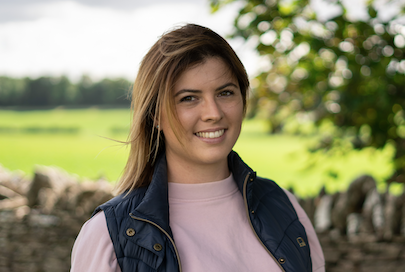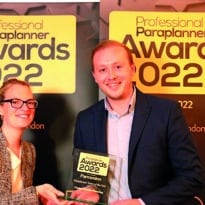Ashley Wiltshire, owner of Wiltshire Paraplanning, tells Rob Kingsbury about how she set up and runs her outsourced paraplanning firm and her imminent move to the United States
Ashley Wiltshire started her outsourced paraplanning firm, Wiltshire Paraplanning, in October 2013 and has built it into a profitable business of seven paraplanners and an office manager, with plans to grow it further.
Born in the USA, Ashley has moved back and forth between the States and England over the years. However, she has lived in England since 2006 and married, had children and built her business here. She has now decided to move to be close to her family in Texas, from where she will continue running the business. It is a move she describes as “exciting but with its challenges”.
To facilitate the move, Ashley has bought in a silent partner to the business. “I had been thinking I would have to sell the business and start anew in the US. But he suggested that if he took a 50% stake we could keep it going.
“We get on really well and it’s turned out to be an exciting time. We’re looking at what we can do to further build the business, including bringing in a couple more paraplanners and another office manager. It’s given me a new lease of life in terms of the future of the business: I have new ideas on how we can grow, and we’re rebranding and building a website and a Facebook page. These are things I’ve not needed before as we’ve mainly worked on referrals – it’s taking things a step forward.
“Importantly, it’s enabled me and my family to move to America and set up a new business over there, while also keeping the business we have built up over the past 6 years.”
Alongside the practical challenges that come with moving to another country, there will be business issues to contend with. Ashley sees the biggest but not insurmountable one being the time difference. Texas is six hours behind the UK, so she intends to start work around 7am (1pm in the UK), which will give her 4-5 hours to speak with the UK business.
“As everyone in the business works remotely, we are used to dealing over the phone or via Skype, the only major change will be the time difference but that is not so great as to be unmanageable,” Ashley says. She also intends to return to the UK for an annual team meeting and to meet clients where needed.
The idea is that she will become less of a hands-on paraplanner and will instead focus on managing and growing the firm. She still expects to undertake some cases and with a compliance hat on, will spot check cases before they go back to the client, she says. “But by stepping back from paraplanning I will be able to take more of an overview and focus on the future of the business.”
Having a business partner physically in the UK will also help, she adds. While not involved in the day-to-day running of the business, where there is a need for things such as face-to-face interviews in the hiring process, he will be on hand to take care of the practical side.
Becoming a paraplanner
Like many people Ashley “fell into” financial services. Having bought herself a one-way ticket from the States to be with her now husband, Sean, a recruitment agency lined up an interview with St James’s Place (SJP) at the company’s headquarters in Cirencester. She began working as a partnerships accounts executive, dealing with the partners, which included travelling in southern England presenting to SJP partners. Then, after nearly five years, she transitioned into a business assurance role.
It was during her time at SJP that one of the directors of the company, Paul Gale, began to talk to her about paraplanning. “I look on Paul as one of my mentors. As a result I started studying for my Diploma.”
Also, while presenting a couple of years earlier, she had met the owners of an outsourced paraplanning company, KDML Consulting Ltd. Wanting to progress and “do something different” she got in touch with them and joined their company as a trainee paraplanner.
“So my experience as a paraplanner has always been in an outsourced role.”
She left there to become a compliance consultant with the Intrinsic network. “This was good experience as it was working outside of the SJP model, which gave me exposure to different advisers and providers and what they offered.”
It was while she was working there that a near death experience made her re-evaluate what she was doing. “It put things into perspective. I realised I wasn’t enjoying compliance but I enjoyed paraplanning. So I thought, right, let’s just do this. So I gave in my notice and started offering a freelance paraplanning service.”
Again it was a mentor who made her think beyond where she was. “I was happy to be paraplanning. I hadn’t looked at the bigger picture and thought about how I could develop it into a business. He put it into my mind that I could take on more paraplanners and grow a business from it.”
Starting the business
It was challenging at the start, with time being the biggest issue. “You have to put in the time as well as the sweat and tears to get a business to where you want it to be. That can affect your life outside of work.”
She began building the business, starting with two paraplanners “but they didn’t work out and I found I had to start again. It was difficult as I was committed to delivering a set amount of work for clients.” Communication with her clients was important at that time, she says, letting them know what was going on and what they could expect.
Over time, Ashley has built the kind of solid, loyal team she envisaged when she set up the firm. “You learn as you go along,” she says.
“What’s important to me is ensuring that, while everyone is self-employed and takes commissions that are right for them and how they want to work, they also feel like they are part of a team. I don’t want anyone to feel they are alone without support, because I’ve been there myself. So we have regular Skype calls and I monitor the stats and whoever has done best every quarter I’ll send them a gift card. We’ll also meet up once a year to do something together. This year we canoed down the Thames; it was hilarious.
“I want paraplanners we work with to enjoy and want to work for us. It’s also important that they can earn well.”
Ashley set up the business working with advice firms in Intrinsic and SJP but gradually shifted to solely work with SJP partners. Currently the firm works with 39 advisers, mainly on a retainer basis. Ashley manages the workflow to ensure the firm’s service standards – providing a five working-day turnaround – are maintained. “Clearly, it all depends on how quickly we can get answers from providers and the complexity of the case but to date even in our busiest times we have been able to keep to that timetable.
“I allocate the work depending on the number of cases people are currently working on. You get to know everyone and how much work they are able to take on at any one time. One of my main tasks is to ensure that our paraplanners always have plenty of work.”
As the firm works virtually, with paraplanners dotted around the country, Skype has been a mainstay over the past few years. However, as part of the new investment in the company, Ashley is working with Excalibur Communications Ltd to bring in a UK-based VOIP telephony system ‘Horizon’, featuring the use of ‘Collaborate’ which will provide an internet-based telephony system, team document sharing and chat function enabling continuous contact for all members of the team, at any time.
One of the reasons the firm has transitioned to work solely with SJP, Ashley says, is the company’s in-house system. “The system is very secure, with an encrypted inbox for delivery of work, and it is also streamlined. The network and intranet are very well structured, information is easy to find and there is a framework to follow for cases,” Ashley explains.
Charging a retainer is the only way for a business to be profitable, Ashley says. “I never wanted us to be a report writing company; we provide a service, and from the start I was readily available to people for any queries they may have and so on. But solely charging case fees meant that any time I was on the phone or simply working on admin and systems for the business, I wasn’t getting paid. So I started charging a set amount for case fees every month, which can be pro-rata rolled over if they are not used, and a smaller amount as a retainer to ensure all other work is paid for too.”
With the impending move to the US changing Ashley’s role from a less hands-on paraplanner to one focussed on managing and building the business, she has gradually been transitioning how she works and instead of undertaking everything to do with a case herself, the office manager has been data gathering, undertaking the necessary calls and, once the case is ready to submit, uploading all the documents to the system.
It’s a system which has worked well and Ashley is looking to extend it by bringing in more people, transitioning the business to have, in effect, an administration resource, thereby allowing the paraplanners to concentrate on the analysis and financial planning of the case while the leg work is undertaken by the office managers.
“A major benefit to this is that cases can continue to be progressed while the paraplanner is involved in the nitty gritty of cases. Also, it means as self-employed people, they can go on holiday knowing their cases are continuing to be processed and work is in the pipeline for when they get back.
“I think it will ease the stress for paraplanners while allowing them to make a consistent amount of money each month.”
A business takes sacrifice, she says. “The biggest drain I found was on family time, especially in the early days where you are having to work hard and all hours to get things off the ground. Also, there will be times along the way where things can go wrong. Then, as the business owner, you just have to put the time in.
“Also, it can be hard to switch off and you need to learn how to do so when it’s needed, especially when you’re with family. In the past I could get quite emotional when there were issues to deal with but I’ve learned to be assertive and pragmatic and not to take things personally. It’s about being professional. I’ve also found that kindness goes a long way.”
Looking ahead over the next year Ashley says she and her business partner are looking to grow the business organically. “Currently, we have the capacity to take on a couple more SJP partners and over the next few months I want to bring in additional paraplanners and another office manager to help with continuity of the business and the administration for the paraplanners. That will enable us to take on more work in a gradual and sustainable way, while meeting our service standards.”





























